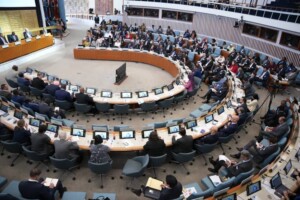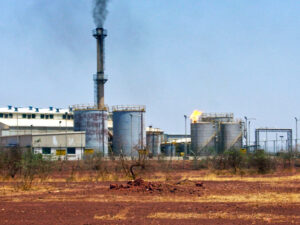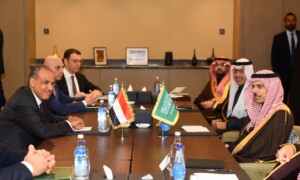WFP win 2020 Nobel peace prize
The UN World Food Programme (WFP) has won the 2020 Nobel peace prize “for its efforts to combat hunger, for its contribution to bettering conditions for peace in conflict-affected areas, and for acting as a driving force in efforts to prevent the use of hunger as a weapon of war and conflict.”
 WFP delivers food to refugees in North Kordofan (File photo WFP)
WFP delivers food to refugees in North Kordofan (File photo WFP)
The UN World Food Programme (WFP) has won the 2020 Nobel peace prize "for its efforts to combat hunger, for its contribution to bettering conditions for peace in conflict-affected areas, and for acting as a driving force in efforts to prevent the use of hunger as a weapon of war and conflict."
The WFP is a UN organisation which has given 88 countries food aid throughout the past year.
The chairwoman of the Norwegian Nobel committee, Berit Reiss-Andersen, revealed the 2020 laureate at the Nobel Institute in Oslo.
In an interview with freelance journalist Stig Arild Pettersen, she said that the WFP was chosen in order to highlight "the importance of multilateralism and international organisations operating to resolve global problems," drawing attention to all the anonymous faces throughout the world who cannot enjoy peace and security.
She said: "We are sending a signal to every nation who raises objections to international cooperation, we are sending a signal to the type of nationalism where the responsibility of global fears is not being faced."
"Hunger is used as a weapon," she said, when asked about the link between food and conflict. "Food is also sometimes a battle of resources, and lack of food caues weak infrastructure, instability, and conflicts among neighbours."
Rebel held areas
In January, WFP arrived in areas controlled by the Sudan People’s Liberation Movement-North faction led by Abdelaziz El Hilu to assess the humanitarian needs in Blue Nile state. The rebel movement described the step as the beginning of the end of the policies of the deposed Al Bashir regime.
The arrival of the WFP team followed a visit to Yabus by WFP chief David Beasley in mid-December 2019, where he met faction leader Abdelaziz El Hilu.
Last month, Sudan’s transitional government signed a joint agreement with the Sudan People’s Liberation Movement-North faction under the leadership of Abdelaziz El Hilu (SPLM-N El Hilu) in the Ethiopian capital of Addis Ababa, in the presence of dignitaries including Beasley. The agreement stipulates that the current cessation of hostilities will continue for the duration of the negotiation process.
Wheat
On April 17, Radio Dabanga reported that WFP Sudan signed an agreement with the Ministry to import 200,000 tons of wheat, which is equivalent to about 10 per cent of the country’s required wheat import for 2020.
The government will repay WFP in Sudanese pounds, which will enable the Central Bank of Sudan to retain more than $50 million in hard currency needed for the import of other strategic commodities.
Flooding
In September, the WFP announced that it would scale up emergency food assistance to reach nearly 160,000 people across Sudan following floods that have ravaged 17 of the country’s 18 states, leaving at least 115 people dead, untold material devastation to homes and farms, countless livestock drowned, and entire towns and villages left destitute.
“Rains and floods have been much worse than anyone could have anticipated, causing a national disaster,” said WFP Representative and Country Director in Sudan, Hameed Nuru, in a statement today.
”People have lost their homes, farmlands, schools ,and loved ones. Some of these people have lost everything.”
COVID-19
“WFP is also working to implement all necessary precautions during distributions to minimize the risk of contacting or spreading COVID-19 and ensure the safety of staff and the people we serve,” Nuru announced in September.
The statement says that WFP’s flood response to date has been made possible by donors, including German Federal Foreign Office, the United Kingdom’s Foreign Commonwealth & Development Office, and the United States Agency for International Development.
Radio Dabanga’s editorial independence means that we can continue to provide factual updates about political developments to Sudanese and international actors, educate people about how to avoid outbreaks of infectious diseases, and provide a window to the world for those in all corners of Sudan. Support Radio Dabanga for as little as €2.50, the equivalent of a cup of coffee.












 and then
and then